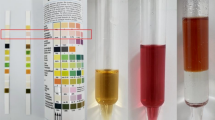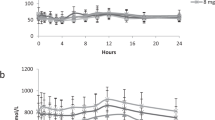Abstract
WHILE studying the urinary chromatographic pattern of a patient in hepatic coma the presence of an abnormal spot R F 0.14 and 0.54 in propanol/ammonia, 7 : 3, and butanol/acetic acid/water, 4 : 1 : 5, respectively, was noted after spraying paper chromatograms with diazotized p-sulphanilic acid. This colour reaction suggested that it might be an imidazole derivative, yet chromatography excluded the possibility of it being histamine, histidine or 1-methylimidazole-4-acetic acid (Table 1). As the presence of this unknown compound could not be related to the diet, or therapy, of the patient and appeared to be associated with the disease, an attempt was made to isolate it.
This is a preview of subscription content, access via your institution
Access options
Subscribe to this journal
Receive 51 print issues and online access
$199.00 per year
only $3.90 per issue
Buy this article
- Purchase on Springer Link
- Instant access to full article PDF
Prices may be subject to local taxes which are calculated during checkout
Similar content being viewed by others
References
McIsaac, W. M., and Page, I. H., J. Biol. Chem., 234, 858 (1959).
Mahler, A. M., and Tabor, H. J., Biol. Chem., 201, 775 (1953).
Inoue, M., Nagasaki Igakkai Zassi, 28, 1281 (1953).
Author information
Authors and Affiliations
Rights and permissions
About this article
Cite this article
McISAAC, W., PAGE, I. Urocanicacidurea associated with Hepatic Coma. Nature 190, 347–348 (1961). https://doi.org/10.1038/190347b0
Issue Date:
DOI: https://doi.org/10.1038/190347b0
Comments
By submitting a comment you agree to abide by our Terms and Community Guidelines. If you find something abusive or that does not comply with our terms or guidelines please flag it as inappropriate.



